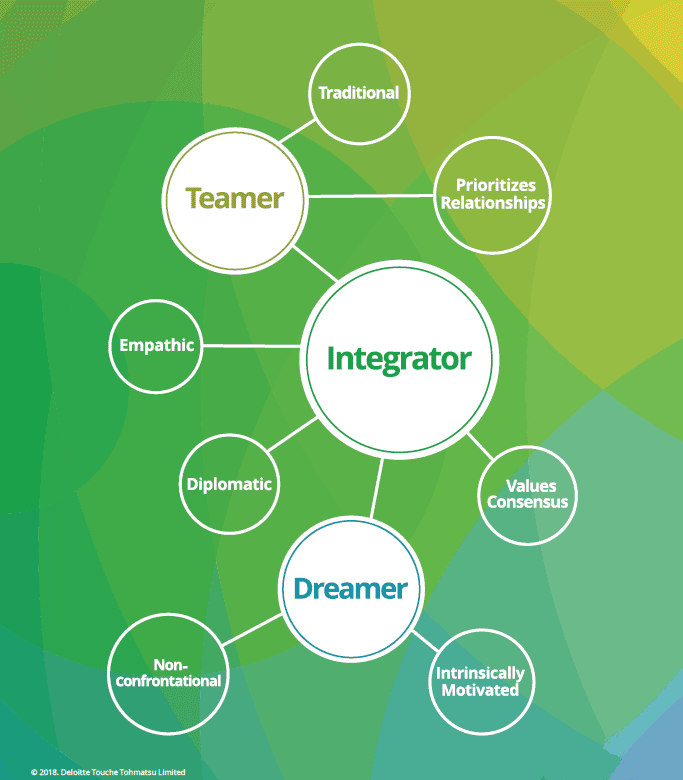

Integrators Value Connection and Draw Teams Together
CONNECTION—that's what it's all about for Integrators, and connector is the role they often play on a team. Sometimes an Integrator is focused on creating connections between people, and other times on connections between ideas. Either way, Integrators like working on teams more than toiling away in solitude. They're trusting and they forge deep relationships—beyond networking or teamwork—getting up close and personal to form real friendships with colleagues.
And there are lots of reasons you'd want to be friends with an Integrator. For one thing, they go out of their way to be helpful. You know that one colleague who's always happy to pitch in and does so with a smile? They're probably an Integrator.
Integrators are great listeners and observers too. They pay close attention to what's being said and can often sense even unspoken emotions and reactions. And then they take others' feelings into account. An Integrator knows that sticks and stones aren't the only things that can hurt relationships—words can too, and they bear this in mind when they consider how to deliver a message. Integrators place a high value on traditions, and this too reflects their sensitivity to the feelings of others. After all, where do traditions come from? People. And from the Integrator's perspective, things that are important to people deserve respect.
Whenever possible, Integrators prefer to avoid confrontation, and their desire to keep the peace is aided by their tendency to see things more in shades of grey than in black and white. From the Integrator's perspective both sides can be right, so why argue about it?
And yet, an Integrator will usually try to bring those with divergent views closer together. They consider it a worthy goal to reach consensus, getting everyone on the same page without leaving anyone out. An Integrator's not going to leave you on the side of the road just because you don't immediately agree on which freeway to take. They'll work with you to understand what's behind a disagreement and how it might be resolved. Sounds like a friend we'd like to have!
Integrators can also be defined by what they're not. Don't try to motivate them through competition or assume they want to be leading the charge—usually an Integrator isn't gunning for first place or jockeying for the baton. Instead, they're driven by a strong sense of duty and a desire to make a difference.
And numbers or technology? Not so much. Words, feelings, and relationships are the Integrator's domain.
There are two subtypes of Integrators. We call them Teamers and Dreamers. Teamers are more extroverted, and Dreamers more introverted.
Teamers
Teamers are outgoing, perhaps best defined by their relationships with others. Those personal connections with colleagues are even more important to Teamers than they are to Dreamers. And Teamers place a higher value on traditions and on loyalty in these relationships too—if you've got their back, they'll have yours. While Teamers go deep with their relationships, they also go broad, including a large swath of people in their extended network—all the better for getting lots of input and diverse perspectives.
Teamers are optimistic, energetic, and quite comfortable expressing their emotions. That makes them a lively presence. If there's a Teamer in the room, you'll probably know it.
Dreamers
Dreamers are typically defined more by what's happening in their head and their heart, which makes them a bit more elusive than the Teamer. Dreamers are reserved, particularly around new people, listening and observing more than talking. During that quiet time, Dreamers are processing what's happening in the moment and what it means, reviewing how things have happened in the past (particularly what's gone wrong), considering what might happen in the future, and tracking how others in the room are feeling and reacting. This tendency is perhaps related to the higher levels of stress that Dreamers report—that's a lot to think about! While they value relationships almost as much as their Teamer colleagues, Dreamers don't spread the love around quite so broadly. Instead, a smaller group of close colleagues is their comfort zone.
Even more so than Teamers, Dreamers' motivations come from within, rather than comparing themselves to or competing with others. They have a strong aversion to confrontation and aren't fond of making decisions that might be unpopular. After all, doing so could lead to a conflict! Dreamers openly admit they aren't always terribly disciplined or realistic about things. Instead they prefer to embrace their quiet creativity as they travel their own winding path.
Overall, Integrators are gestalt thinkers who excel at seeing how individual pieces fit into a larger context. They're natural mediators who understand diverse perspectives, without needing to prove that one is better than another. They value a positive, inclusive, and respectful environment and strong relationships with others.
And yet, while Integrators are befriending and helping everyone, people are complaining about them, just as they do about all the other types. (Is no one safe from criticism?)
Which brings us to…
The Issues with Integrators
Just Say What You Mean
One of the most common criticisms of Integrators is that their diplomatic style makes it difficult to know where they stand—do you love my idea or hate it? I can't tell. Others complain that they have to flex their interpretation muscles, doing extra reps just to understand an Integrator's meaning. Some go so far as to say that the Integrator's indirectness causes a trust issue. Or sometimes the problem is in following a conversation that occurs in a roundabout way because an Integrator is trying to spare someone's feelings. So many loop-the-loops can lead to motion sickness and leave listeners wishing that the Integrator would just be straight with them. What's the real deal?
Toughen Up
While Integrators are busy considering everyone else's feelings, they don't always get the same courtesy. Instead, they're accused of being overemotional and oversensitive. Apparently the touchy-feely stuff can make others uncomfortable. People complain they often have to worry about hurting an Integrator's feelings and that it's exhausting to have emotions in the mix at work. They don't want to have to wonder who's going to take offense next.
You can't Please Everyone
One of the reasons for the Integrator's indirect style is their aversion to conflict, and some people see this as a real problem. To hear others tell it, there might be a giant pink elephant sitting in the middle of the conference table and an Integrator wouldn't acknowledge it if they fear it may cause a conflict. Suppose someone else thinks the elephant is purple. Will it lead to an uncomfortable argument? Integrators are sometimes perceived as so intent on being liked and making everyone happy that they elevate these goals above making the best decision or getting work accomplished efficiently.
How Many Cooks do we Really Need?
And speaking of decisions, people sometimes also see Integrators as being overly inclusive and taking too long to make decisions because they're trying to make sure everyone is on board. While many see consensus as a nice-to-have, Integrators see it as a priority. If everyone agrees with a decision, then they're all more likely to push hard toward making things happen, right? But others sometimes complain that a decision everyone agrees with is necessarily a watered down or weaker decision. And it can take a long time to get there.
Just Decide Already
And once they've taken absolutely forever to make a decision that includes everyone's input, the Integrator is still prone to changing their mind! Other types complain endlessly about this tendency of Integrators. The Integrator is often considering new information, additional input, or shifting context, but to others it can seem like they're simply delaying things or causing rework because they're being wishy-washy.
But before you dismiss Integrators as fickle or flighty, consider…
The (Social) Intelligence of Integrators
Despite the complaints people have about Integrators, when asked which type is most enjoyable to work with, more people say Integrators than any other type. And there are lots of reasons people appreciate them.
Come a Little Closer
If two people are standing on opposite banks of a river and need to accomplish something together, a bridge might be a good idea. Integrators often serve as that bridge. Their ability to see both sides of an issue, combined with their diplomatic skill, makes Integrators well suited to the roles of mediator, facilitator, and peacemaker. An Integrator can help two sides understand each other a little better and can illuminate the ways in which each might shift their position enough so that the chasm between them isn't so wide. In a time when teamwork is paramount, bringing people and teams together is perhaps the Integrator's greatest strength.
I Hear You
One of the reasons Integrators are so skilled at their Integratory-magic is that they tend to be great question askers and listeners. When's the last time someone truly listened to you? The Integrator's specialty is asking people for their input, opinions, thoughts, suggestions, and reactions. The bottom line is, people feel understood when someone really listens, and they start to trust the listener. Once the Integrator gains that trust, they can lead a person toward understanding someone else, and pretty soon people are stepping into each other's shoes and taking a bit of a stroll together.
I Feel You
While some would like to pretend we can all leave our emotions at home, in reality those pesky sentiments sometimes accompany us to work whether we'd like them to or not. And that can be a good thing. The ability to sense others' emotions gives the Integrator another tool to work with in their efforts to understand and harmonize. Their sense of compassion means many people are more comfortable sharing their thoughts or feelings with an Integrator than they might be with someone else, and this further aids the Integrator in identifying ways to bring people closer.
Happy to Help!
We've likely all experienced the difference between a colleague who is happy to help and one who does so begrudgingly, or even worse, stands in the way of what you need to get done. It's just darn pleasant to be around a helpful Integrator, and not only that, you can accomplish more, faster, when you have a helpful colleague contributing to your efforts.
Web-Weavers
Integrators have an uncanny knack for connecting ideas that others might not connect, and for recognizing context others might not see. Say your newly formed team needs to complete a complex project but it's unclear who's in charge. An Integrator is likely to be the one to suggest that the solution might be found in how ants collaborate without a leader. Or, imagine a situation where various cost-cutting measures are being considered. An Integrator is likely to point out the domino effects of one option or the other, and to help envision the long-term implications each might have.
Integrators are…
 Empathic, diplomatic, and relationship oriented
Empathic, diplomatic, and relationship oriented Attuned to nuance; they see shades of grey rather than black and white
Attuned to nuance; they see shades of grey rather than black and white Inclined to weigh all the options and check with others prior to making decisions
Inclined to weigh all the options and check with others prior to making decisions

© 2018. Deloitte Touche Tohmatsu Limited

“A house divided against itself cannot stand.”
Abraham Lincoln
16th President of the United States

The 16th president of the United States, Abraham Lincoln, is known as The Great Emancipator. He paved the way to abolishing slavery while working tirelessly to preserve his country and ensure that “government of the people, by the people, for the people, shall not perish from the earth.”
In addition to his height and his hat (in which he kept important documents), he's remembered for his character. He shared credit with others when things went well, and took his share of the blame when they didn't. He was known as being attentive, inclusive, empathic, and diplomatic.
These are characteristics of the INTEGRATOR.
Lincoln came from humble beginnings and taught himself how to read and write on his Kentucky family farm. With less than a year of formal education, he earned his certificate to practice law in Illinois, which in those days simply required one to exhibit good moral character.
Lincoln was a man who prioritized listening over expressing his own opinions. And he came by that listening habit honestly—prior to his career in law he was a bartender at Berry & Lincoln, a tavern he briefly co-owned. As a lawyer he preferred to help legal rivals find compromise and settlement, but if mediation failed, one of his greatest assets as an attorney was his ability to appeal to the jury through earnest and purpose-driven stories.
Lincoln's sincere and simple oratory style made him a man of the people and he used these attributes to develop a career in politics. Through a senate race (lost) and a presidential campaign (won) he gained a national reputation for his social responsibility and empathy. His presidential speeches moved people, sometimes to tears. Four months after the Union defeated the Confederate Army, Lincoln delivered the Gettysburg Address. This compassionate president was sure to choose every word carefully. Recognizing the sacrifices made to preserve a free country, his speech, now engraved on the wall of the Lincoln Memorial, continues to inspire those who read it.
His sense of empathy extended to animals as well. When asked about whether Lincoln had any hobbies, his wife once replied, “Cats.” Stories of his cat-scapades include his once letting a feline friend eat from the table during a formal White House dinner, and his rescue of a trio of orphaned kittens while visiting General Grant in Virginia. He was also the first president to pardon the White House turkey on Thanksgiving (a holiday he proclaimed), sparing its life because his son had grown attached to it.
As president, and as listener-in-chief, Lincoln held White House office hours, during which anyone could stop by to chat. He was an inclusive leader who valued the strengths and perspectives of others, even his rivals whom he chose to be part of his cabinet. He esteemed his younger constituents too. Once an 11-year-old girl wrote to Lincoln encouraging him to grow a beard, because he would “look a great deal better” and because “all the ladies like whiskers.” Not only did he reply to her letter, but he sought further counsel, writing: “As to the whiskers, never having worn any, do you not think people would call it a piece of silly affectation if I were to begin it now?”
Lincoln was compelled by a strong sense of duty. He had a ceaseless desire to bring consensus and calm across the land, and also to seek freedom for all people. He's perhaps best known for his role in passing the 13th constitutional amendment, but his underlying and enduring goal was focused on the preservation of the union. Celebrated for his ability to bring people together, connect on a personal level, and build trust through listening, Abraham Lincoln led with an Integrator style, and he left big shoes for succeeding presidents to fill—size 14, in fact.
